University of Suffolk NEWS
WELCOME
The words “degree” and “graduate” come from gradus, meaning “step”. It’s a big step to go to university to study and it’s an even bigger step to leave and move on with your life and career.
There was excitement in the air as our graduation ceremonies got underway this year. Excited, relieved and sometimes emotional, graduates and their very proud families and friends all lined up to celebrate the effort and achievement that has resulted in obtaining a degree. As staff, we were also proud of our students, having watched them develop their skills and attributes and then succeed in the courses they chose to study.
Yet as more people than ever before are going to university, the discourse on value for money of a university education continues. So what does it mean to us here in Suffolk?
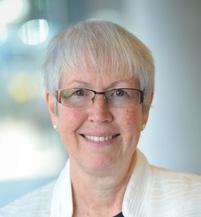
Our students remain a diverse community reflecting variety in age, modes of study, and a healthy gender balance. Our students expect to receive high quality teaching and a rich learning experience justifying the investment they have made with us and in themselves.
However, there are different views and interpretations of what ‘value for money’ in higher education means. As our graduating students move on with their lives, into work and developing their careers more broadly, how will they look back on the value of their time at university? Will it just be about their studies with us or will they increasingly look at where their education enables them to go next, or what impact has their education had on their earning potential, as well as how well their education
Issue 8 Autumn/Winter 2019
prepared them for not only the world of work but also to cope and navigate the ever present change that they will experience.
The wider discussion on the value of a university has never been more prevalent and it is good to remind ourselves of the broader benefit that we are increasingly bringing to our society. As you will read in this issue, our first independently published economic impact report has been released. As well as being a large employer in our town, we spend around £14m in our supply chain and for every £1 of income, the University of Suffolk generated £9 Gross Value Added. We have supported our community through regeneration of the Waterfront area, the delivery of key frontline public services in health and education, facilitating wider access to education for non-traditional students, bringing income into the town and county, and broader economic impact through tourism, business support and research. Given that we have had such good support from business and industry, public sector organisations, third sector and more broadly our local and regional community to ensure that a University of Suffolk could be developed, it is great that we can demonstrate our commitment and impact for individuals and our region in this way.
As our students graduate and move on, they become our Alumni Community. In the UK we have not yet fully embraced the alumni concept with graduates having often limited contact with their university once they have left. We want to ensure that this is not the case for our
University of Suffolk NEWS Issue 8 Autumn/Winter 2019 Page 1
continued on next page
Welcome 1
In focus 3
The Princess Royal visits the new DigiTech Centre for digital research and training at BT’s Adastral Park Campus 3
High quality student experience is at the heart of what we do 4
New Students’ Union social space 5 Our growing partnership portfolio 6
Graduation 2019 7
Building a Sustainable Wellbeing Culture 8
News and updates 9
World’s first augmented reality asthma app shortlisted in national awards 9
Economic impact report 9
The Hold 10
International conference on sustainability 11 Student awarded ‘Trainee of the Year’ at Hospital awards ceremony 12
Solo shows for art students 12
New Board members appointed 13
First Gals that Game event 14
JPUH Future Nurse Award 14
Deaf Signing GCSE challenge 15
Parent and Carer Ambassador project launched 15 Exchange programme for nursing students with Keio University, Japan 16
Downing Street welcomes first generation of ‘Unlocked’ prison officers 17
Research and publications 17
Student work to feature in European conference 17
2019 Emerald Literati Awards 17
Young people’s perceptions of provision and opportunities in Suffolk 18 Dementia Together 19
Events 20
Open Lecture in association with DanceEast 20 Events 20 Over to you 20
Graduation 2019 20
graduates. We believe that we can develop an offer that not only supports their continuous professional development but can also support current students as they engage with, and learn from graduates who have taken multiple career pathways. There is a real opportunity for our graduates to share their experiences of transitioning into employment and a career, supporting the ambitions and development of current students, and demonstrating that they continue to develop.
So well done to all our graduating students – we are proud of all you have achieved and become. Don’t forget us, become an active alumni member and help us to shape the experience for future students. Well done also to all staff at the University - it’s a team effort to support and educate our students over the entirety of their time with us and we are equally proud of all your hard work and effort as you go the extra mile to help students achieve their best.
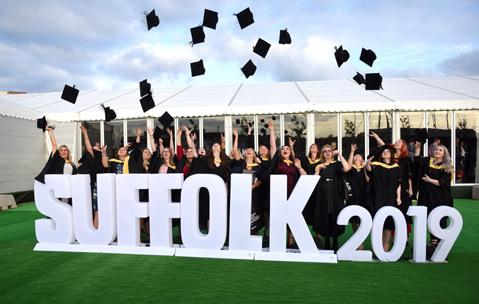
Graduation is a celebration of achievement, a day to be proud and a day to create wonderful memories. Congratulations to you all.
Professor Helen Langton Vice-Chancellor
See our feature on Graduation 2019 on page 7 and more photos on page 20
Issue 8 Autumn/Winter 2019 University of Suffolk NEWS Page 2
Welcome continued Contents
IN FOCUS
The Princess Royal visits the new DigiTech Centre for digital research and training at BT’s Adastral Park Campus
A new digital skills training centre has been visited by HRH Princess Anne at BT’s Adastral Park research and engineering campus in Suffolk.
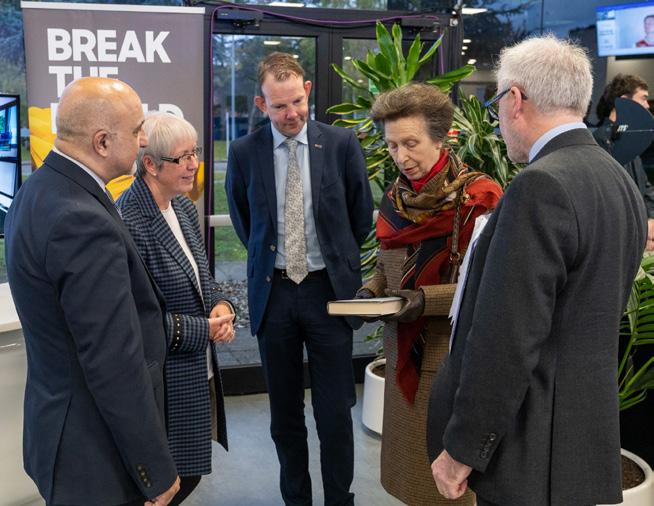
The DigiTech Centre, a collaboration between the University and BT, with funding from the New Anglia Local Enterprise Partnership (LEP), will provide training in cutting-edge digital skills for people looking to pursue careers in the nationally-important information and communications technology (ICT) sector, as well as fuelling high tech businesses who increasingly require access to a talented technology workforce.
The DigiTech centre will be based in remodelled and modernised buildings at Adastral Park, and become home to the ICT and Digital Creative courses offered by the University of Suffolk. In addition, it will offer a range of new innovative research and training programmes in emerging technology areas such as:
Telecoms and future networks
Artificial intelligence (AI)
Data science and software defined systems
Cloud computing
Digital creative skills
All aspects of smart metrology, testing and verification
Professor Tim Whitley, Managing Director of Research at BT, said, “We’re honoured to receive the blessing of Her Royal Highness for this new initiative that will play such an important role in UK IT and technology. This new centre will create a rich pipeline of new technology talent, powering the East of England’s growing reputation as an ICT powerhouse, and fuelling the growth of innovative businesses across the UK.
“We’re delighted to be working with the University of Suffolk and the New Anglia LEP to embed the Digitech Centre at the heart of the Innovation Martlesham technology cluster, and create a rich ecosystem for growth in digital innovation.”
Professor Helen Langton, Vice Chancellor said, “We’re delighted to have been able to share this new initiative with Her Royal Highness. The new Centre will allow us the opportunity to form a unique partnership uniting our young, and modern University with a world leading telecommunications company in BT. In a rapidly developing technological age we want the Centre to be a state of the art ‘solution centre’ for SMEs and other businesses as well as research and knowledge transfer hub.
“The centre will have world-class co-working specialist laboratories, and will make Suffolk a recognised destination for industry-focused ICT and Digital Creative study programmes and an internationally recognised destination for continuous professional development in digital technologies.”
University of Suffolk NEWS Issue 8 Autumn/Winter 2019 Page 3
Photo: Lee Wilkinson
High quality student experience
By Professor Mohammad Dastbaz, Deputy Vice-Chancellor
Our University’s Academic Strategy clearly states that building a strong sense of community, breaking down barriers, viewing our students as co-creators of knowledge and intellectual property, and viewing the developing and improving student experience as a continuous process should be at the heart of our approach to providing an excellent student experience.
In order to achieve this, the University has been in the process of fundamentally reshaping its approach to learning and teaching and putting in place various initiatives to improve our student experience.
A dedicated ‘Student Experience Group’, which includes our Students’ Union President and Vice President, as well as senior academic leaders from every School and our key professional services colleagues, together with representatives from our partner colleges have been meeting monthly over the past year to examine various issues raised by our students and champion a number of specific student focused projects. These include longer library hours, more study skills support (from 1,300 hours in 2018 to 7,000 hours in 2019), better responsive support for our online learning environment,
2019 NSS Summary
The teaching of my course
1 Staff are good at explaining things.
2 Staff have made the subject interesting.
is at the heart of what we do
improvements to our IT services and our estate, new initiatives on more timely feedback, publishing of assessment timetables for all our courses at the beginning of the year, new approaches to timetabling and a comprehensive induction programme are just some of the projects undertaken over the last academic year.
It was therefore very pleasing that the National Students Survey (NSS) results for 2019 show significant improvements to levels of satisfaction by our students. Seven courses at the University of Suffolk have scored 100% in NSS-2019. These included: English, History, Diagnostic Radiography, Midwifery, Child Health Nursing, Sport and Exercise Science and Business Management. Also, Graphic Design, Social Work, Criminology, Early Childhood Studies and Psychology and Sociology scored 90% or above and the University’s overall satisfaction rose by 4% to 80%. Going forward we will continue to build on the work we have already put in place with academic Schools, the student community and the Students’ Union to make further improvements. We strive to provide an excellent student experience, as well as a creative and enjoyable place to learn and study. In short, high quality student experience is at the heart of what we do.
3 The course is intellecually stimulating. 83 80
4 My course has challenged me to achieve my best work. 81 79
Learning Opportunities
5 My course has provided me with opportunities to explore ideas or concepts in depth. 83 80
6 My course has provided me with opportunities to bring information and ideas together from different topics. 84 80
7 My course has provided me with opportunities to apply what I have learned. 86 80
Issue 8 Autumn/Winter 2019 University of Suffolk NEWS Page 4
IN FOCUS
University Year 2019 % Agree 2018 % Agree
84
Question
80
87
83
84 79
85 80
IN FOCUS
New Students’ Union social space
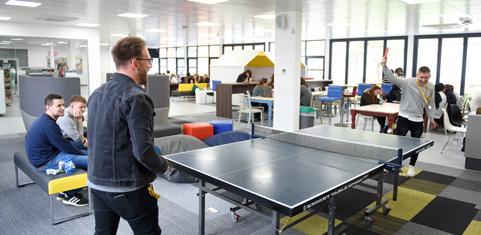
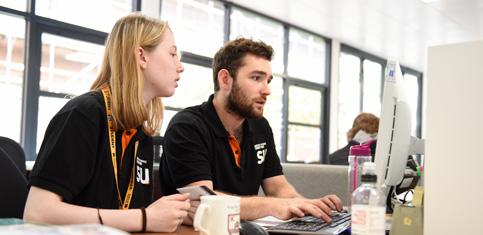 By Amy Grant, SU Vice President
By Amy Grant, SU Vice President
Student feedback for many years has been that the University lacked a space where students could relax and socialise without feeling pressured to purchase food or drink. The Students’ Union wanted to respond to this feedback so we campaigned on getting a social space and shop on campus. Thanks to a financial contribution of £320,000, students now have a welcoming environment to have
some respite, meet friends and lecturers and buy coffee or a meal deal if they wish to. The space also features a kitchenette with a microwave, allowing students to bring and prepare their own food. This was another important aspect to be included in the space as these facilities were high on the student agenda. Overall, feedback from students has demonstrated that the Social Space has exceeded everyone expectations.
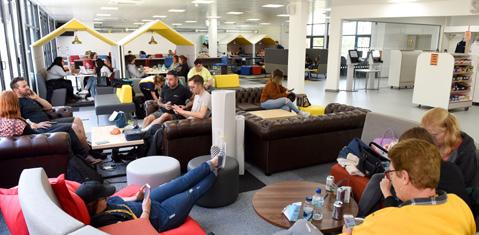

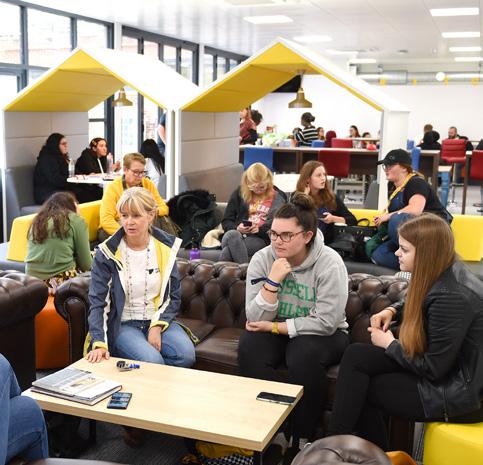
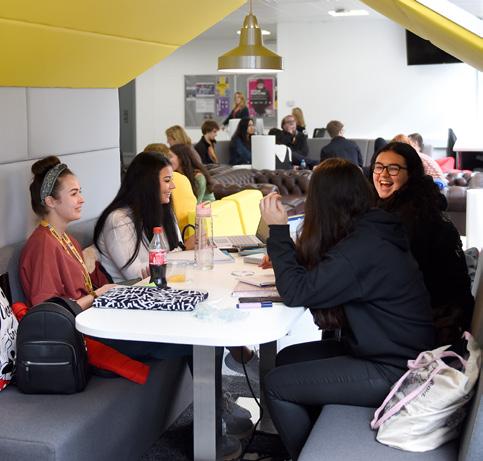
University of Suffolk NEWS Issue 8 Autumn/Winter 2019 Page 5
IN FOCUS
Our growing partnership portfolio
By Professor Mohammad Dastbaz, Deputy Vice-Chancellor
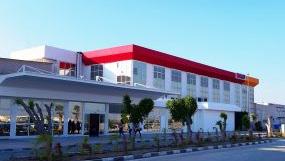
The University of Suffolk has a long-standing regional partnership with several Further Education Colleges that over the last decade has helped the University develop its portfolio and student recruitment from across Suffolk and Norfolk.
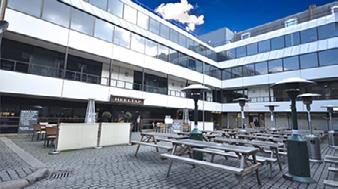
Beyond this however and over the past two years, the University has been approached by several UK and international private providers for possible collaborations in either a franchise or validated model. This has been a new area of development for the University.
The University has given the go-ahead to a limited number of partnerships, including with the London School of Commerce (LSC) and the Global Business School (GBS). This has resulted in delivering our courses in London; with the potential of Manchester and Birmingham at a later date. So far, our approach has been to select a small number of the many proposals we received and, pending successful due diligence, to proceed cautiously to institutional recognition. This is then followed by programme validation and start of delivery.
The partnerships we have in place has provided the University with significant growth in student numbers, with over 2,000 new students during 2018/19 academic year with potential growth in 2019/20 and later years. Many of the students recruited by our partnership providers are mature students from non-traditional backgrounds who would have not normally
considered going to university. We are now working very closely with our partners to ensure that the quality of the teaching and assessment and the overall student experience is on par with our students here at the Ipswich campus.
Furthermore, we have also been approached by at least a dozen private partners abroad who are keen to co-operate with the University.
Following site visits and discussion at the Board of Directors in the 2017/18 academic year, we have now started our franchise arrangements in Malta, Sri Lanka and soon in Malaysia. These will be mainly Business students going through our MBA programmes at our partner institutions.
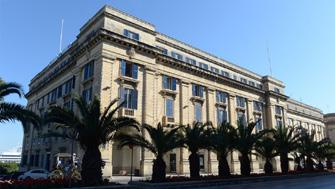
Online Delivery
Following extensive discussion with UNICAF, who is one of the leading online education providers partnering with UK, US, European and African universities, we are in the process of starting the delivery of our MSc Public Health and soon our MBA online through UNICAF. They operate campuses and learning centres throughout Africa, and are currently present in 12 countries, including Egypt, Ghana, Kenya, Malawi, Nigeria, Somalia, Uganda, Zimbabwe, Rwanda, South Africa and Zambia.
Working with a prestigious and large provider like UNICAF will undoubtedly help our international development and establishing our University in overseas markets.
Issue 8 Autumn/Winter 2019 University of Suffolk NEWS Page 6
UNICAF European Offices in Cyprus
LSC Malta LSC London
GRADUATION 2019
1,926 students received degrees at graduation ceremonies held across Suffolk in October.
In Ipswich, the University of Suffolk Mace was used for the first time. Within higher education, a ceremonial mace has been a symbol of university scholarship and integrity since the 11th century. Local wood turner, Darren Breeze (pictured), created the Mace using the design by Elizabeth Martin. Elizabeth’s design was chosen following a county-wide competition. The Mace uses traditional and modern materials including elements made using the University’s 3D printer.
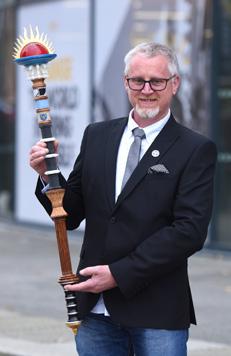
Professor Helen Langton, Vice-Chancellor, said, “Being a young university, we wanted something traditional but with a modern twist. We are keen to demonstrate that as a University we are forward-thinking but keen to preserve and respect our county’s heritage. The judging panel liked the fact that Elizabeth’s design incorporated typically Suffolk symbols and associations but in a subtle way. Elizabeth’s design features the sun rising over the sea and features the University’s iconic Question Mark. Three ‘nut bolts’ symbolise Suffolk’s Trinity: the Suffolk Punch horse, the Black Faced sheep and the Red Poll cattle.”
The first cohort from the Leadership and Custodial Environments masters graduated this year. The masters programme is delivered by Unlocked Graduates and aims to meet the need for more prison officers. Laura Polley (pictured) completed the Masters and will now be working
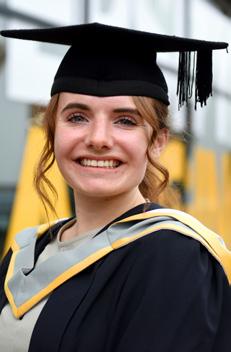
at the University as a Lecturer in Criminology. Laura said, “Being the first cohort, a lot of it was unknown so it is great to see us all finish the course successfully and graduating together, it is a really nice feeling.”
“I have always been interested in helping offenders and working within the criminal justice sector. I started by studying Criminology here at the University of Suffolk. I wanted to continue studying in the same field and to join the mission of reducing re-offending. The opportunities the University have given me have been great; I didn’t want to go anywhere else, there was no reason to leave the county.”
“The course, and the job combined, gives you so many skills that are transferable too, so there are many different areas of employment. I have got ambitions of doing a PGCE and a PhD so for me taking a lecturing route is the best option for now so I can focus on my academic career.”
Honorary awards were presented to:
Rebecca Crerar Fred Langford Kerry Ellis Ian Livingstone CBE Sarah Holmes Daemmon Reeve Nik Kershaw
To find out more about our honorary award recipients please visit www.uos.ac.uk/honorary-graduates-fellows
Photo galleries from the ceremonies can be found here: Ipswich, Bury St Edmunds, Great Yarmouth.
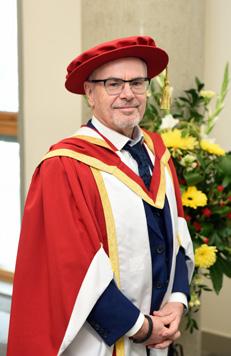
University of Suffolk NEWS Issue 8 Autumn/Winter 2019 Page 7
Darren Breeze
Nik Kershaw
Laura Polley
BUILDING A SUSTAINABLE WELLBEING CULTURE
By Teresa Steward, Head of HR Projects
In our last newsletter, we shared the start of our wellbeing journey and what we had planned to focus on. The purpose is to make our environment an even better and emotionally healthy place to work and study. Our first step in developing sustainable change and enhancing our performance is to learn more about our staff needs and identify where we need to focus our efforts to achieve this. Here is just some of what we have been doing towards our goal.
Wellbeing Performance Audit
Run by Suffolk Mind, the audit was open for three weeks. We had an amazing response rate of 70.7% which Suffolk Mind said demonstrates high engagement from staff. Thank you to all those who participated. Suffolk Mind have presented the results and facilitating action planning with the Senior Leadership Team. An overview of what we said and what we are doing in response is available here. It is hoped that our learning from the audit will also help inform our wellbeing provision for both our staff and students. The audit will be undertaken every six months over the next two years so we can review the journey made and continuously develop. We are also currently working with Suffolk Mind to review the first audit process to enhance the tool. Already, Suffolk Mind have developed the tool to provide an instant summary of individual audit results direct to the participant ready for the next audit.
Staff briefings about the results are plannedview dates here
All Staff Development Event
Thank you to all those who attended. Part of this event continued our focus on mental health and wellbeing. Our views given at the event on the various related discussion boards are very much valued and we have collated the 500 comments into themes to help us digest the raw data. This data will feed into the Wellbeing Group to inform our emerging Wellbeing Strategy and also into various other relevant forums. Presentation slides of the event can be viewed by staff here.
Wellbeing Group
The group have been exploring different Wellbeing Frameworks to inform the development of a whole University Wellbeing Strategy. Views were sought from staff about two particular frameworks: Step Change Model to Mental Health and the CIPD Wellbeing Model at the above event. The group have reviewed feedback and are now drafting our own University Framework for further consultation. Opportunities for further staff and student involvement in the development of this Strategy and how we bring this alive will be announced in the new year.
Vice-Chancellor’s Mental Wellbeing Group Update
The first meeting is planned to be held in November and is made up of those who have expressed an interest or have a key role in wellbeing related activities across the institution, including the Students’ Union. The meeting will focus on the remit of the group, considering how we start to pull together wellbeing activity across the University for both staff and students.
Next issue
Feedback from the Wellbeing Audit, Sharing our Stories: Clubs and events supporting our wellbeing.
Top tips ‘Achieving more control in our life…’
Issue 8 Autumn/Winter 2019 University of Suffolk NEWS Page 8
NEWS AND UPDATES
World’s first augmented reality asthma app shortlisted in national awards
Since we introduced the University’s first Knowledge Transfer Partnership (KTP) in the last issue of the newsletter, it has been shortlisted for a national award.
The revolutionary new app to help children with asthma, MySpira, has been shortlisted for the Knowledge Exchange/Transfer Initiative of the Year Award in the Times Higher Education (THE) Awards 2019.
Director of Business Engagement and Entrepreneurship at the University, Stef Thorne, said, “A key aim of any KTP project is to be
Economic impact report
An independent report has been published showing, for the first time, the economic impact of the University.
It showed that in the academic year 2017/18; the University generated £103m Gross Value Added (GVA) and supported 2,270 jobs across the UK. Of this £41m GVA and 820 jobs were in Ipswich, £56m GVA and 1,210 jobs were in Suffolk.
The full impact of the University extends beyond its quantifiable economic contributions. It has stimulated a wider educational, social, economic and cultural transformation, which has had a significant impact on the local economy and the local population. For example, it is noted in the report that the University is credited for being a catalyst for change in the regeneration of the Ipswich Waterfront; for supporting the delivery of key frontline public services in health and education and for establishing an educational institution that is embedded within the local business community and responsive to its needs.
One of the biggest impacts is the creation of the University itself. The report noted the multilayered impact that has come as a result of
of benefit to all of the partners involved- the company, the University and a graduate associate. This project delivered this and much more with the huge potential to transform lives and communities through innovation. The impact and reach of the use of this app has gone beyond our expectations and demonstrates the value of businesses and universities working together, not just for wealth creation but for transformational impact on people’s lives and their communities. We are really pleased to be shortlisted for this award and look forward to many more of these collaborations.”
creating a higher education facility where none had previously existed. Before the establishment of the University of Suffolk in 2016, Suffolk was one of just four counties without a university and experienced lower than average progression rates into higher education.
As a community impact university, the University of Suffolk aims to have a direct impact on the communities it serves, and to facilitate wider access to higher education for students who would not normally consider it or for those from under-represented groups. Graeme Blackett, Director of BiGGAR Economics who compiled the report, highlights “BiGGAR Economics has undertaken economic impact assessments of more than 100 universities across Europe. One of the things that really struck us about the University of Suffolk is how it has attracted, retained and supported students from backgrounds that may not have traditionally considered going to university. This has had a transformational effect on many individual students and a significant economic impact on the region.”
The full economic impact report and the executive summary can be found here.
University of Suffolk NEWS Issue 8 Autumn/Winter 2019 Page 9
NEWS AND UPDATES
The Hold
The Topping Out ceremony of The Hold took place in September and was marked by a brief ceremony in front of representatives from construction firm RG Carter, Suffolk County Council, the University, Ipswich Vision and the National Lottery Heritage Fund.
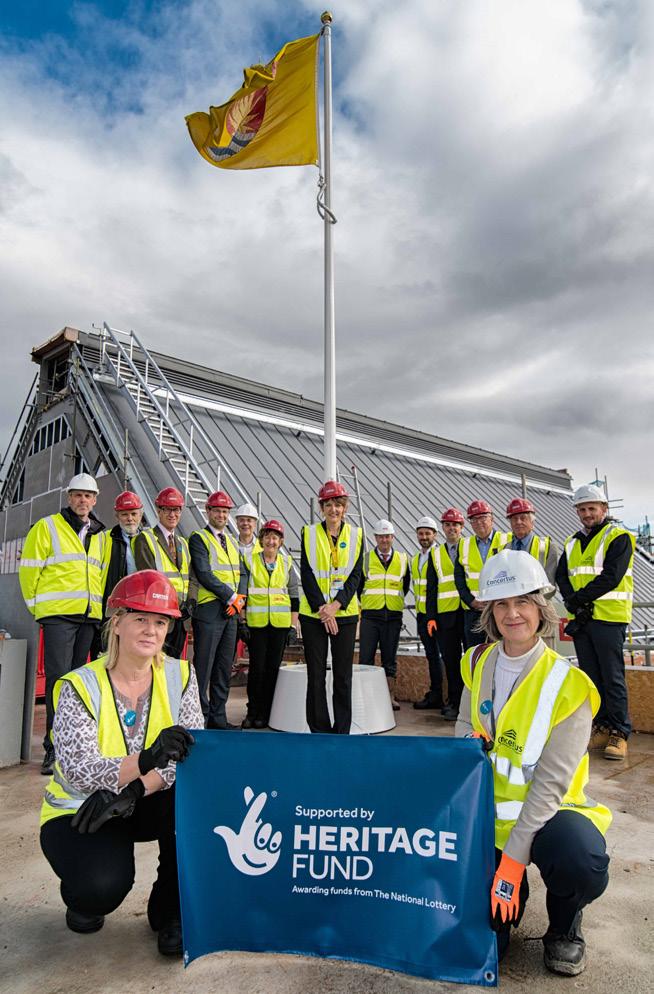
Located on campus, The Hold will house the majority of Suffolk’s nationally and internationally significant archives.
Locally brewed alcoholfree ‘Ghost Ship’ pale ale, kindly donated by Adnams, was poured onto the newly completed roof of The Hold building to mark the exciting milestone in the project, and in keeping with Dutch tradition (a nod to Ipswich’s historical connections with the country), bottles were handed out to all the construction workers. The Suffolk Flag was also flying high from the building to mark the occasion.
More than just a new building, ‘The Hold’ project will also be the engine for a transformed, audience-focused Archives service reaching out to diverse communities in Ipswich, the county and the nation, through its activity and digital programmes, engaging people in new and exciting ways.
The project is a partnership between Suffolk Archives and the University of Suffolk, a part of Ipswich Vision and is supported by heritage organisations across Suffolk, The National Lottery Heritage Fund and other funding bodies such as Coastal Communities and many more.
The Hold is on schedule to open in spring 2020.
Issue 8 Autumn/Winter 2019 University of Suffolk NEWS Page 10
NEWS AND UPDATES
International conference on sustainability
The University hosted the International SEEDS (Sustainable Ecological Engineering Design for Society) Conference on sustainability and the built environment in September.
Justine Oakes, from the Suffolk Sustainability Institute and Sustainability Manager at the University of Suffolk, said, “The built environment dominates humanities impact on the natural world. For the majority of us, the rural and urban communities we pass through daily, have all been shaped and designed by social and economic growth requirements. So it therefore makes sense, that with a growing population, the key route to progressing towards a sustainable future is to focus, quite literally, on building it!
It was the first time we have hosted the conference and delegates were welcomed from across the world. We worked in partnership with Leeds Beckett University and Technological University Dublin.
The built environment has a greater impact on natural resources and produces more waste than any other industry. The SEEDS conference focused on the changes that are taking place and the benefits or consequences that are being predicted and measured regarding the built environment’s impacts.
It comes after the launch of the Suffolk Sustainability Institute in 2018 which is a partnership with Suffolk County Council and regional stakeholders.
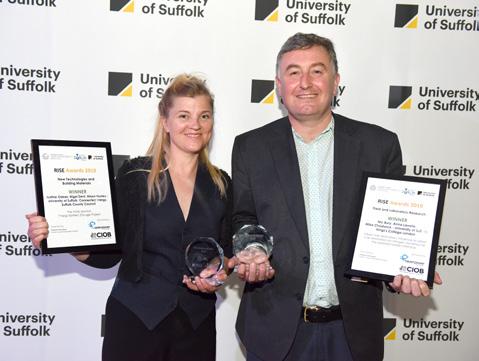
The Institute provides consultancy, and research; supporting innovation and enabling knowledge transfer and skills development for business, community, policy and place makers, in Suffolk and through UK wide established networks, building a knowledge base that has clear benefit to its partners.
It provides a regional centre of excellence for transforming, and supporting a constant dynamic progression towards UN’s Sustainable Development Goals (SDGs).
“Built environment activities are key contributors to climate change, energy consumption, waste generation, resource depletion, biodegradation and diminished human health. All challenges that formed the focus of this year’s SEEDS Conference. This event presented an exceptional opportunity for global knowledge transfer within our region.”
The conference was supported by Haven Power and was bridged by the RISE Awards, at Milsoms in Kesgrave. The annual awards celebrated talented companies, groups and individuals who are changing the nature of the built environment industry through extensive research, development and innovation.

University of Suffolk NEWS Issue 8 Autumn/Winter 2019 Page 11
Student awarded ‘Trainee of the Year’ at Hospital awards ceremony
A Radiotherapy and Oncology student has been awarded Trainee of the Year at the first East Suffolk and North Essex NHS Foundation Trust staff awards.
Beth Leggett is currently in her second year and attends Ipswich Hospital as a student therapeutic radiographer on placement.

She said of the award “I was beyond grateful and overwhelmed to have even been nominated for this award, let alone to have won, especially against some of the incredible teams and individuals that represent the amazing work done on a daily basis in the NHS. Everyone there was so deserving and I’m so proud to have spent such a good evening with fellow colleagues.”
70 teams and individuals from across the Trust were celebrated in seven categories at the awards ceremony held at the Stoke by Nayland Hotel. The judging panel included executive directors, staff representatives, patient representatives, former award winners, allied health professionals, a doctor, nursing colleagues and operational colleagues.
Solo shows for art students
The hospital radiotherapy team said they had been ‘blown away’ by Beth’s compassion, and patients often seek her out for support and help.
Zoe Grant, Lecturer in Therapeutic Radiography at the University of Suffolk, said, “I am delighted to hear that Beth has received this award. This highlights Beth’s good practice, delivering care with compassion whilst supporting the amazing team of therapeutic radiographers at Ipswich Hospital during her clinical placements.”
Two graduates from the BA (Hons) Fine Art degree course have been showing their work in solo shows.
Bobby Forsythe was approached to exhibit following her work in the end of year degree show. The light based solo show entitled ‘Luminous’ was on show at the Silent St Gallery in Ipswich this summer, followed by a residency at SPACE Colchester.
Meanwhile fellow graduate Brittany Van Wezel exhibited her work, entitled ‘We are Women’, in Felixstowe and was interviewed on BBC Radio Suffolk.

Issue 8 Autumn/Winter 2019 University of Suffolk NEWS Page 12 NEWS
AND UPDATES
NEWS AND UPDATES
New Board members appointed
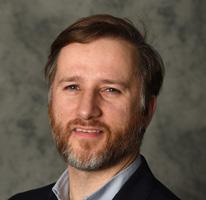
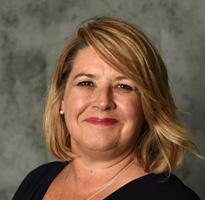
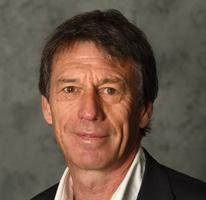
The University of Suffolk Board has welcomed six new members:
Kevin Black
Kev has had a very successful 30 year career in telecommunications with BT, working across the UK, Europe, Asia and North America.
Kev is a strong believer in education at the centre of society, and alongside his commitment to the University, he undertakes voluntary work in outreach to schools in the area, supporting the STEM agenda (Science, Technology, Engineering and Mathematics).
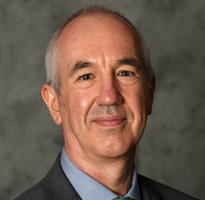
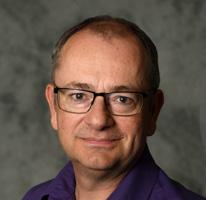
Steve Clarke
A highly experienced finance professional with nearly 30 years working as an executive board member in national multi-million pound organisations and delivering complex change.
For the last 5 years of this period he was the National Finance Director of Health Education England (budget £5 billion), responsible also for Business Intelligence and IT.
Dr Pauline Essah
Dr Essah is a Senior Manager for Global Health at the UK’s National Institute for Health Research (NIHR). She strategically oversees the use of Official Development Assistance Funding to support partnerships between UK health research experts and their colleagues in Low and Middle-Income Countries (LMICs) around the world. This results in innovative, high quality and sustainable health research being conducted to strengthen capacity in LMICs, advance science, promote economic growth and transform people’s lives.
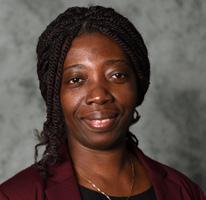
Karen Livingstone
Karen has a range of experience from across the Eastern region. Currently a National Director in the NHS she leads on innovation having created the award winning SBRI Healthcare programme. SBRI Healthcare is a unique innovation investment programme that has supported over 200 companies to develop innovative solutions for NHS problems. Karen is also leading on the development of the Innovation Exchange, creating a common framework for the identification, selection and supported adoption of innovations into the NHS.
Andrew Smith
Andrew is Chief Executive of Havebury Housing Partnership, based in Bury St Edmunds. The Partnership owns and manages over 6,500 homes across Suffolk and Norfolk with a range of tenures from rental to supported properties. He is also a Director of its commercial subsidiary, Havebury Homes Limited, which develops housing for outright sale.
Zephan Trent
Zephan is Director of Strategic Transformation/Locality Director at NHS England and NHS Improvement in the East of England. He was previously Assistant Director of Strategic Finance at NHS Improvement and Deputy Director for Analytics and Intelligence at Monitor (sector regulator for health). He has also worked at Imperial Healthcare NHS Trust as Interim Deputy Director of Transformation and in the consulting sector as an economic and financial consultant.
University of Suffolk NEWS Issue 8 Autumn/Winter 2019 Page 13
First Gals that Game event
The Suffolk Centre for Female Entrepreneurship has hosted the first ‘Gals that Game’ games jam.
The event aimed to offer a friendly and supportive environment for those interested in exploring the field of game development and was supported by Women in Games, as well as local games developers.
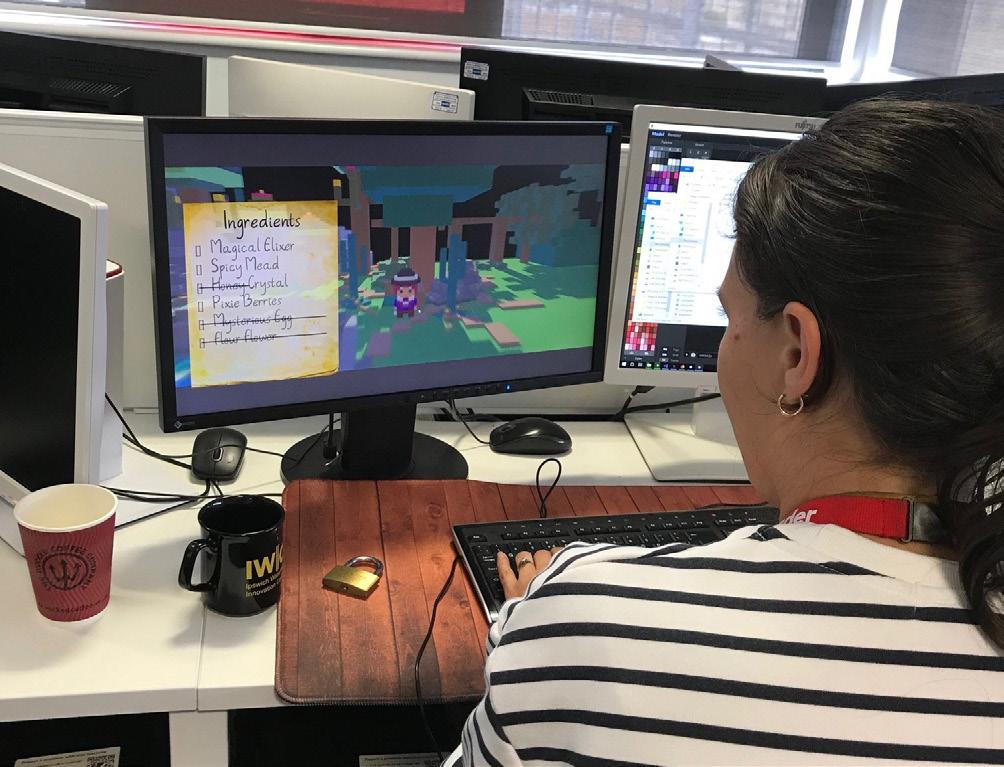
JPUH Future Nurse Award
A new scheme to encourage students to embark on a career in nursing at their local hospital has been launched.
The James Paget 2020 Future Nurse Award programme gives students from Great Yarmouth and Waveney an exclusive financial incentive to train locally as a nurse, studying for a BSc (Hons) Adult Nursing degree.
The award scheme is a joint initiative between the James Paget University Hospital (JPUH) and the University– and also brings with it the guarantee of a job at the hospital, once students have qualified.
It has been developed with support from Health Education England and the first successful applicants will start studying for the degree, with a placement at the James Paget, in January.
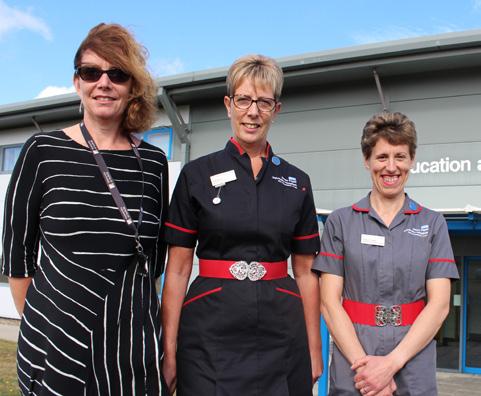
Issue 8 Autumn/Winter 2019 University of Suffolk NEWS Page 14 NEWS AND UPDATES
NEWS AND UPDATES
Deaf Signing GCSE challenge
University of Suffolk employee and recent graduate of the BA (Hons) Special Educational Needs and Disabilities degree, Terrie Cornwell-Dunnett has been challenged by the House of Commons to write a GCSE in Signing with a proposal to embed in the National Curriculum in the future.
Terrie has campaigned tirelessly for British Sign Language to be a recognised language GCSE option, lobbying MP’s at every opportunity. Gaining in confidence since achieving the Patron’s Award at the Festival of Learning and her degree, Terrie has now got the go-ahead from Nick Gibb, Schools Minister, to scope out this idea. To start the ball rolling, she is piloting signing workshops with undergraduates at the University, gaining valuable feedback to support her campaign.
Terrie has joined forces with the National Deaf Children’s Society, in particular with Daniel and Ann Jillings. Together they will write the curriculum and campaign for its inclusion in the curriculum.
She says that without the valuable support and guidance of the Course Leader, Dr Allison Boggis and her dissertation supervisor, Dr Wendy Lecluyse, she would never have dreamed this was possible.
Terrie acknowledges that it will take some time and hard work to get this idea into fruition but is confident it will go ahead now the group have the government’s support.
Parent and Carer Ambassador project launched
The University has launched a new project recognising the important role parents and carers play in supporting students going to university.
We are looking for parents and carers whose child is either currently at university or has recently graduated to take part in the parent and carer ambassador project.
Dr Jack Massie, Higher Education Parent/ Carer Champion, explains, “Parents and carers can be key influencers. We are looking for willing participants who can share what the university experience is like from their perspective with their peers. It’s a paid role, on a casual basis; it will work out to be a commitment of around 20 hours per year so it would work well alongside a current job or perhaps those who are retired, like grandparents.”
The role is being funded by the Ipswich Opportunity Area and delivered through Take Your Place, a national governmentfunded project which aims to encourage more students to go to university.
Dr Massie added, “We would like to recruit up to 15 parent/carer ambassadors initially; we are especially interested in working with parents and carers from Ipswich, Lowestoft and Haverhill. There aren’t many universities in the country who have a project like this so we are leading the way and hoping it will help bridge the gap that can exist between the university, applicants and parents.”
To find out more about the project and to express your interest in taking part, please click here
University of Suffolk NEWS Issue 8 Autumn/Winter 2019 Page 15
NEWS AND UPDATES
Exchange programme for nursing students with Keio
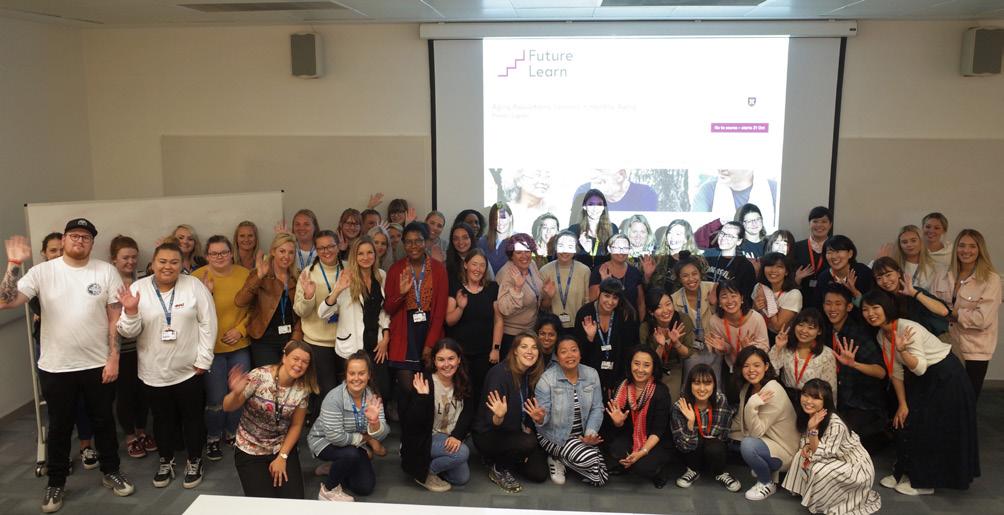
University, Japan
Every year the School of Health and Sports Sciences hosts a study tour for 12 student nurses and two academic staff from Keio University in Tokyo. During their time with us, the students attend a wide range of lectures and have the opportunity to visit a range of health care provision in the local area.
This year the programme ran from 4–10 September, and on their first day, the Japanese students joined the September 2017 cohorts for a presentation by Associate Professor Tomoko Koike of Keio on the ‘Rise of the Super Aged Society in Japan’. The Keio students then gave a lively and interesting presentation of Japanese culture to our students which was enjoyed by all.
Over the course of the next seven days the students, accompanied by Associate Professor Koike and their interpreter, Associate Professor Rika Fujiya, visited two Acute Trusts (Ipswich and West Suffolk), two hospices (EACH and St Elizabeth’s) and a nursing home (Baylham), and we are grateful to our partners for once again accommodating the Keio group.
The study tour also included a range of lectures delivered by our academic staff and on their last day the Keio students were presented with certificates by Dr Samantha Chenery-Morris, Associate Dean, Learning, Teaching and Student Experience.
In February 2020, Keio University will host four students from Suffolk along with others from the USA, Korea, China as well as Japan to take part in their annual study tour.
Keio University is a private, leading research university located in central Tokyo and is the oldest institute of modern higher education in Japan with 33,500+ students and 2,250+ staff. The University has eleven campuses in Tokyo and Kanagawa, and has 10 faculties and 30 Research Centres. Interestingly, their Hiyoshi Campus is also one of the preparation camps for TeamGB Tokyo 2020.
Issue 8 Autumn/Winter 2019 University of Suffolk NEWS Page 16
Downing Street welcomes first generation of ‘Unlocked’ prison officers
After two years working in prisons, the first ever class of Unlocked Graduate prison officers completed the programme with a celebration event at Number 10 Downing Street to meet the Secretary of State for Justice, David Gauke, and Prisons Minister, Robert Buckland.

The officers completing the programme competed with 600 graduates to claim one of 50 places on the scheme in 2017. While working as full-time frontline prison officers in HMPs Brixton, Coldingley, Downview, High Down, Isis and Wandsworth, the officers were required to undertake a rigorous programme of study to complete a Masters degree focused on system reform in prisons. Working with experienced mentoring prison officers they were challenged to continually improve as well as
identifying improvements they could implement in their prisons. These ideas ranged from revamping the induction process at HMP Brixton to changing how medicines are dispensed at HMP Wandsworth.
All the founding Governors said they would be keen to welcome more Unlocked officers in coming years.
RESEARCH AND PUBLICATIONS
Student work to feature in European conference
Two abstracts of work carried out by our level 6 students in their final year projects has been accepted for publication in 13th European Nutrition Conference, Federation of European Nutrition Societies (FENS) 2019 in Dublin, Ireland.
These projects are:
1. ‘The Vascular Protective Effects of Organic Natural Yogurt and Oats in Older Adults’ — Emma Harvey Lawrence and Dr Fandi Ibrahim
2. ‘A Novel Dietary Protocol for Functional Bowel Disorders’ — Philippa Stribling and Dr Fandi Ibrahim
For more information about the conference click here
2019 Emerald Literati Awards
An academic article by Dr Clare Gartland, Associate Professor of Education, has been selected as Highly Commended in the 2019 Emerald Literati Awards.
The article entitled Supporting progression to HE: the role of colleges and vocational courses has been published in Education + Training.
University of Suffolk NEWS Issue 8 Autumn/Winter 2019 Page 17
NEWS AND UPDATES
RESEARCH AND PUBLICATIONS
Young people’s perceptions of provision and opportunities in Suffolk
The Bishop of St Edmundsbury and Ipswich launched a major report looking at young people’s perceptions of provision and opportunities in Suffolk.
The University of Suffolk were commissioned to compile the report by the Bishop and a consortium of sponsors. It provides in-depth qualitative research investigating the views of young people in Suffolk about their opinions of their communities and the challenges they face.
The consortium consisting of the Diocese, the Suffolk Community Foundation and the Ipswich Opportunity Area funded the research in an attempt to ensure that young people felt they had a voice in identifying issues and helping to inform possible solutions.
Bishop Martin said, “It is vital young people living in Suffolk, with some of the problems that have been widely publicised, have a platform to be heard, both on the issues and the solutions. This report by the University of Suffolk will make a significant contribution to our understanding of their lives and views. What is clear is that they do have clear opinions and perhaps surprisingly, a very common and coherent set of views wherever they are in the county. It is also very clear that the needs they have are ones that we as county should be able to address. In terms of next steps, it is my role to challenge those with influential voices in Suffolk to work together and respond quickly and meaningfully. We will also be looking at some new funding streams to help.”
The Suffolk Community Foundation and the Police and Crime Commissioner attended the launch and announced details of new funding opportunities to address some of the issues raised.
Katie Tyrrell, Research Associate at the
University, the author of the report said, “Young people are often consulted in a tokenistic way; this research was a way to actively engage with young people meaningfully, with their voice at the centre. They were pleased to be asked, to give their views and responded enthusiastically. There are clear messages in the report and it is vital that young people continue to contribute to the identification of issues and the development of solutions.”
Young people, aged 11-18, volunteered to participate in focus group discussions with creative mapping activities across Ipswich, Claydon, Leiston, Lowestoft, Felixstowe and Haverhill.
The research identified the need for:
1. Safe social spaces across the county.
2. Adequate transport and better information in order to access existing provision.
3. A greater understanding of young people’s needs across the wider community.
4. Involving young people in identifying the issues they face and informing the solutions. Katie said, “Young people told us they were frustrated with the lack of things to do within their local communities, this was especially so for those in rural communities, where there was a difficulty in accessing provision. There was also a view that there is a barrier in gaining work experience and employment opportunities.
“The fear of crime, violence and gang activity was clear in negatively influencing young people’s movements. Many described feelings of disconnect and social exclusion and the groups expressed a desire to have a safe, indoor social space to not only spend time with friends but also to seek support from a variety of services.”
The report can be downloaded from here
The Executive Summary can be found here
Issue 8 Autumn/Winter 2019 University of Suffolk NEWS Page 18
RESEARCH AND PUBLICATIONS
Dementia Together
Sue Ryder, The Chantry Neurological Care Centre, hosted an event to celebrate the launch of the Dementia Together evaluation report, written by the University of Suffolk.
Dementia Together provides practical information and support for people living with dementia and their carers in Suffolk. The project, now in its third year of operation, works with local community services to provide co - ordinated, responsive support for individuals at every step of the way – whether that is information about dementia, connecting with others who understand, or planning for the future.
The University of Suffolk were commissioned to complete an evaluation based on outcomes for people living with dementia identified when the service model was designed.
The event provided an opportunity to provide feedback on the evaluation report on how the service was received by those who had been helped, including people with dementia and their carers.
The report found that:
After contact with Dementia Together, people with dementia felt they had a better understanding of their condition and available services.
The majority of people with dementia felt the service helped them better manage their condition, avoid crisis and enhance physical and mental health.
Carers felt they had more information about dementia and could cope better as a carer.
Carers felt a better sense of wellbeing, increased knowledge and confidence.
Jo Marshall, Centre Director, Sue Ryder, The Chantry Neurological Care Centre, said, “We are delighted that the findings of the report
show that Dementia Together is achieving the positive outcomes for people they told us were needed. It has been a privilege to work on the development of the service and we will continue to listen and respond to the needs of people living with dementia and their carers.”
Dr Ruth Strudwick, co-author of the report from the University of Suffolk, added, “The Dementia Together Service, led by Sue Ryder, was launched in April 2017 and by the end of December 2018 had registered and supported 2,202 people, both people living with dementia and their carers living across Suffolk. Despite a comprehensive range of services across Suffolk, people living with dementia were overwhelmed by varying offers which disabled them accessing the most appropriate services to meet their needs.
“The service evaluation results highlight the importance of promoting choice, empowerment and options to people living with dementia and their carers in identifying support provision. The service was highlighted as responsive and flexible to the needs of people living with dementia and their carers, as well as providing a useful resource for external organisations for signposting and referral.
“The service aided in crisis avoidance, by providing consistent, accessible information and support. The Dementia Together service has made a significant positive difference to people living with dementia, their families and carers across Suffolk, and provides an effective model for the development of peri-diagnostic dementia services nationally.”
To find out more about Dementia Together, click here
The full evaluation report and a summary can be found here
University of Suffolk NEWS Issue 8 Autumn/Winter 2019 Page 19
GRADUATION 2019
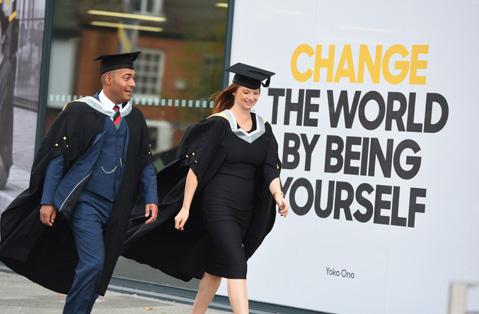

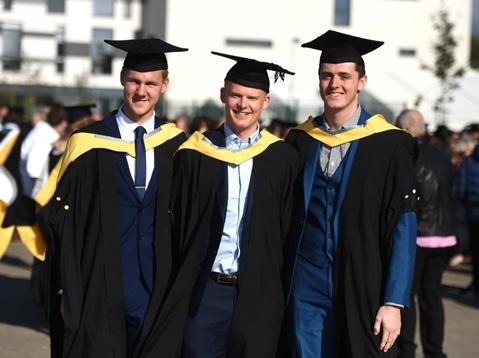
Open Lecture in association with DanceEast
Leading the Dance — Jeanette Siddall CBE
Tuesday 3 December 2019, 6.00–8.00pm Waterfront Building, Ipswich
Registration from 5.30pm with the lecture starting at 6.00pm.
Today, dance is popular and trendy, found in television reality shows, advertisements, music videos, theatres, cinemas, streets, and parks. It engages people of all ages, abilities and interests as creators, dancers, participants and audiences. Yet, in its contemporary diversity and liveliness, dance only emerged in the UK from the 1960s.
This talk will look at how dance has transformed over the last few decades. It will focus on DanceEast and the Jerwood DanceHouse which celebrates its 10th anniversary in 2019, to explore the difference a building can make and how the development of a new and distinctive kind of arts building, the Dancehouse, has helped shape ideas about what dance is, means and can do.
Places are free but please register here
Issue 8 Autumn/Winter 2019 University of Suffolk NEWS Page 20
EVENTS
Events To find out more about our events please visit www.uos.ac.uk/events Over to you We want this newsletter to be a reflection of all of the excellent projects, research and work being undertaken by our staff. If you have any feedback and suggestions for content please get in touch by emailing
at
Atlanta Blair
atlanta.blair@uos.ac.uk Thank you.





 By Amy Grant, SU Vice President
By Amy Grant, SU Vice President



























